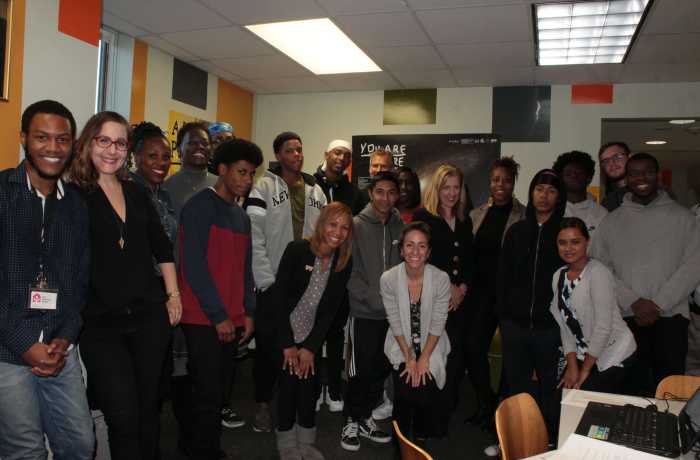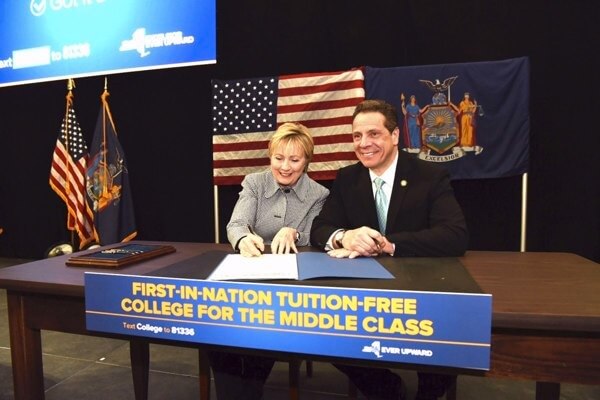This past semester, Luis Farias worked at Verizon while taking two classes at Brooklyn College. Living alone near campus, he worked 40 hours a week to sustain himself, all while trying to finish his degree to help land a better-paying job.
“Living on my own can be expensive, especially while trying to pay my way through college,” said Farias, who wishes he could afford to take more classes to get his bachelor’s sooner.
Farias is among the nearly 40% of CUNY’s students who attend part time while they also work to support themselves or their families — a financial burden that the pandemic only exacerbated as family members lost jobs, became ill or worse.
Until now, these 93,0000 students have been effectively ineligible for the state’s Tuition Assistance Program (TAP) because the program has required recipients to earn at least 12 credits in an undergraduate degree program in two consecutive semesters. For part-time students who are juggling job demands and family responsibilities, that’s a high bar.
But TAP will now be available to qualifying students taking at least six credits a semester. That change — forged this spring when Governor Kathy Hochul and state legislative leaders approved a transformative budget for higher education — will expand TAP to reach thousands of part-time students. The expansion is part of the historic $1.2 billion increase for CUNY provided in the 2022-2023 state budget — crucial both to New York’s post-pandemic recovery and to that of our students.
The $150 million boost for TAP will expand the program to many thousands of low-income students who are pursuing undergraduate degrees part time, and to the growing number who are enrolled in non-degree workforce training programs. It also will restore eligibility to TAP for incarcerated students, ending a 26-year moratorium.
It’s not an overstatement to say that the TAP expansion will be a life-changer for a great number of New Yorkers — current CUNY students, those who have dropped out because of financial pressures and students of the future who might otherwise not pursue post-secondary education. Many who might have dropped out of college in previous years — or who never started — will be able to continue their education. And there’s reason for hope that many who had no choice but to quit during the pandemic will now find it possible to come back.
TAP for Workforce
Equally exciting and far-reaching is “TAP for Workforce,” the expansion of tuition assistance, for the first time, to students enrolled in the kind of skills-based workforce training programs that are growing as an alternative, or a complement, to traditional academic degrees. Numerous studies have found increasing demand for short-term, affordable non-degree programs with direct connections to the workforce. A survey by Strada Education Network found that more than a third of Americans who lost their jobs during the pandemic wanted to change careers, and most preferred non-degree skills training as the path to that goal.
Over the past few years CUNY and its colleges have been responding to this need by adding non-degree workforce training programs such as the CUNY Upskilling Initiative, which is part of a three-year effort to connect tens of thousands of New Yorkers to skills-based training. TAP for Workforce is a major win for tens of thousands of students in these and other adult and continuing education programs. And it will be a win for an economy that is responsive to the needs of employers and geared to training workers quickly for sustaining careers in fast-moving fields like health care and technology.
More broadly, the expansion of TAP is a forward-thinking move for the public good. It will advance equity and diversity in the workforce and champion the principle that helping New Yorkers become agile and adaptable workers who can embrace new technology and skills to thrive is vital to building a resilient and more inclusive economy.
The pandemic’s harsh tolls have only intensified the urgency of CUNY’s historical mission to put students of all backgrounds on a path to upward economic and social mobility. Expanding tuition assistance will allow many more students and working adults to advance their futures without having to choose between this week’s paycheck and a pathway to a better job.
Matos Rodríguez is the chancellor of The City University of New York (CUNY), the largest urban public university system in the United States.


































